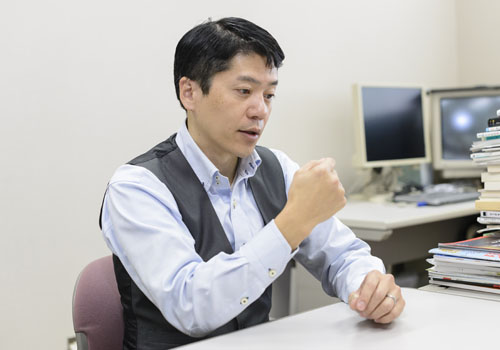
Special interview

Fascinated by psychology and cognitive science, where you can use whatever research method interests you
Nobuyuki Kawai
Professor
【Graduate School of Informatics】
Department of Cognitive and Psychological Sciences
【School of Informatics】
Department of Human and Social Informatics

Comparing humans to animals shows us the qualities we share with them as well as what is unique about the human mind
-Tell us about your research.
I work in psychology and cognitive science. Simply put, these fields study the nature and workings of the human mind. My area of specialization is experimental psychology, which uses actual tests to study how the mind works. Within that, I'm doing research in biopsychology, a field that is closely related to biology. We try to find out how people's minds work by doing studies on monkeys and by looking at physiological reactions in human beings—things like brainwaves, heart activity, and electrodermal activity (which is used in polygraph testing).
For example, we might look at brainwaves or heartbeat to study how the body and brain react when we get angry. In these experiments, we anger the subject by making derogatory comments about something they are asked to write, and then measure their physiological and psychological state to find out what happens. With half the subjects, we apologize for writing the comments—with the other half, we don't. We then compare the two scenarios. When people are simply angered, their left brain is activated, the heart rate and electrodermal activity increases, and their entire body goes into an excited state. When they read the line that apologizes, only their electrodermal activity goes up. If we pair this information with psychological measures and study it further, we find that when someone gets angry, both aggression towards the other person (the desire to pick a fight with them) and discomfort increase. When they get an apology, their heart rate and brain activity remain steady, while only their discomfort increases. This tells us that electrodermal activity measures discomfort. When we study anger in this way, we find that it is not a single emotion, but the result of two overlapping vectors—discomfort and aggression towards another person. We also learn how apologies work.
Another thing we research is fear of snakes. Human beings are programmed to quickly identify dangers or things they are afraid of, but some people think that our fear of snakes is something learned, and comes from the fact that they appear in myths all over the world. To study the sensitive reaction people have to snakes, we took a picture of koalas with a snake in it and a picture full of snakes with a koala in it and measured the time it took for the person to find the odd animal. The study found that people find the snake faster than they find the koala. Various measurements suggest that people are afraid of snakes from the time they are infants. But since we don't have decisive proof of this, we decided to do the same experiment with monkeys born and raised in a lab—animals that had never seen a snake before. And it turns out that they still found the snake faster. This tells us that both humans and monkeys have the same sensitive reaction to snakes. About 6,500 years ago, the common ancestor of both humans and monkeys lived in trees about 30 meters above ground. The only animals to come after that ancestors to prey on would have been snakes, raptors, and large cats. And the only one of those animals able to get high up in the trees among the thick branches would have been the snake. The number of primate species began to increase around that time, and rapid brain development meant that the portion of the brain able to detect snakes became more sophisticated as well. As a result, the descendants of these animals—both monkeys and humans—demonstrate this sensitive reaction that allows them to quickly identify snakes. This is what we've discovered through our research.
Comparing people to monkeys tells us a great deal about how the human mind is put together. When you're buying a smartphone, for instance, you can't understand the benefits and features of a particular model unless you compare it with other models—even if you look at the catalog for that model. By looking at issues that concern both of us and comparing humans to animals, we discover what is unique about us as well as the things we have in common psychologically—such as the ability we share with monkeys to quickly locate snakes.

Do what I did and gather lots of knowledge when you get to university
-What knowledge is needed in your field?
Since we have to create our own programs to use in our experiments, we need to know about computer programming. I didn't learn programming in high school or college, so I had to figure it out as I went. Now I'm able to write programs that are quite sophisticated.
You also need knowledge of statistics in order analyze the results of the experiments, plus a good understanding of neuroscience, physiology, genetic research, and general psychology. But I didn't do any biology or statistics in high school; in fact, I studied all kinds of things that had nothing to do with my field. So there's no need to worry too much about what you studied in high school. These are things you learn as an undergrad or graduate student, or else study on your own.
Psychology is such a young field that I thought I might be able to contribute to it
-What made you decide to get into this field of research?
Philosophical questions interested me when I was in high school, and I was often thinking about them or reading books on them. I wanted to become a university professor, but I figured there was nothing I could add to philosophy—given that people have been studying it for over two thousand years now. At the time, the universities that offered psychology majors were extremely limited, but I thought I might be able to contribute something to such a young field, since the short history of psychology only goes back about a hundred years. So I decided to go into it. I began doing human research after taking my post at Nagoya University, though I still continue my work with monkeys. Like psychology, the cognitive sciences study the workings of the mind—so we aren't limited to researching people. We can look at recreating mental function through artificial intelligence or study animals besides human beings. Since psychology does have a certain amount of history behind it, there are established methodologies. Cognitive science, on the other hand, has only been around for about thirty years—so it has a sense of freedom in that you can use whatever methods you want to study just about anything you find interesting. That's what attracted me to the field, and I've been there doing research for more than a decade now.

A research group that takes the best of the humanities and the sciences by bringing psychology and cognitive science together
-What message can you give students looking to get into this new department?
There aren't many places in Japan where you can study both psychology and cognitive science together. Both fields strive to define the human mind. But whereas psychology focuses on empirical and scientific methods based on evidence (such as experiments and surveys), cognitive science also brings in new research methods like computer simulation. They are closely related in that they aim to explain our thoughts and emotions, and this makes our department extremely unique. We have a diverse collection of researchers here who try to understand the human mind from all kinds of angles—people like me who are interested in animals, those who try to recreate mental processes in computers, those who study the way the brain works, and so on. I originally came from the humanities, but now my research is closely tied to biology and engineering. One of the strengths of our research organization is that it brings together the best of both worlds in terms of the humanities and the sciences. We would love to have people join us if they want to study human or animal minds or perhaps try to create a computer that is able to think for itself.
